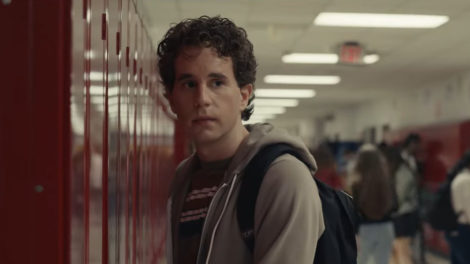Dear Evan Hansen
Tropic Sprockets by Ian Brockway
[mr_rating_result]Steven Chbosky (“Wonder”) helms the film adaptation of “Dear Evan Hansen,” the Tony-nominated Broadway show. The film is earnest and well produced and preserves the spirit of the stage production. It contains lively numbers and fine ensemble acting. The plot however is somewhat syrup-like in its filmed incarnation, soapy and tepid.
 Evan Hansen (Ben Platt, reprising his Broadway role) is a very awkward high-school student who seemingly sweats perpetually. He has anxiety and depression and one friend Jared (Nic Dodani). Evan has invariably hunched shoulders and many times he is paralyzed by fear, unable to move or speak.
Evan Hansen (Ben Platt, reprising his Broadway role) is a very awkward high-school student who seemingly sweats perpetually. He has anxiety and depression and one friend Jared (Nic Dodani). Evan has invariably hunched shoulders and many times he is paralyzed by fear, unable to move or speak.
His mother (Julianne Moore) is a much in demand nurse, and not always on call and present for her son. To make matters worse, his father filed for divorce when Evan was a toddler, and now never answers his text messages.
Evan secretly pines for a cute girl next-door Zoey (Kaitlyn Dever), but is powerless to approach her because of his anxiety. He is pressured by his mother to make friends.
At the computer station after an angry encounter, he gets the school bad boy Connor (Colton Ryan) to sign his cast. (In an earlier scene, Evan falls from a tree.) Connor happily signs in big black script presumably because it is rebellious. But by chance he sees Evan’s assignment: a self-addressed letter of confession about his thoughts of Connor’s sister Zoey and his own crippling insecurity. Connor becomes enraged, protective of his sister’s privacy and keeps Evan’s letter.
 Three days later, Connor commits suicide with the letter in his pocket.
Three days later, Connor commits suicide with the letter in his pocket.
Connor’s mom (Amy Adams) is convinced that Evan was her son’s best friend. Seeing that she is so emotional and on edge, Evan goes along with the assumption, to a degree. Then a startling thing happens: Evan becomes extraordinarily popular online as the tragic young man’s best friend.
Moore, Adams, Dever and Platt deliver solid performances. But midway, the momentum stalls with heaps of hand ringing melodrama and predictable outcomes. Much of the tension shifts to an idle gear with the dialogue feeling serialized, as if from television.
During much of the film Evan remains unchanged, his shoulders weighted with labored breath. At times, this borders on caricature, given the pronounced looks of pity from the students. Physical gestures are crucial on stage, but in a film, the impact loses its punch. How much more provocative and daring would it be if Evan somehow maintained his ruse?
The music is catchy and has earwig appeal but those with no prior knowledge of the winning Broadway musical, might well feel bereft, alone in an apple orchard from TV Land.
Write Ian at ianfree11@yahoo.com


Ratings & Comments
[mr_rating_form]